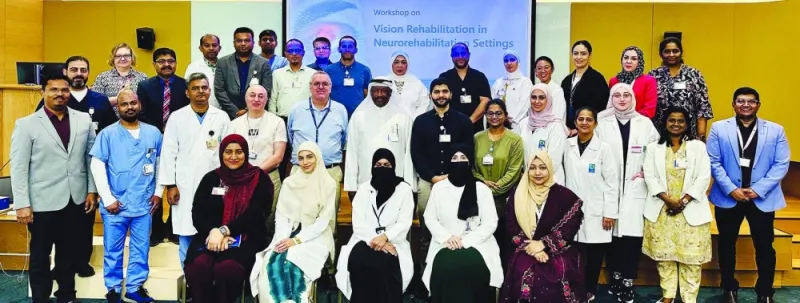
403
Sorry!!
Error! We're sorry, but the page you were looking for doesn't exist.
HMC Unveils Qatar's First Neurovision Rehabilitation Programme
(MENAFN- Gulf Times) The Corporate Rehabilitation Therapy Services at Hamad Medical Corporation (HMC) has introduced Qatar's first dedicated Neurovision Rehabilitation services to address the needs of both adult and paediatric patients with vision impairments caused by neurological conditions such as neurodevelopmental disorders, stroke, and Traumatic Brain Injury (TBI).
This initiative aligns with HMC's strategic vision to provide excellence in service delivery and patient experience, as envisioned in Qatar's Third National Development Strategy.
Vision impairments are common in neurological disorders, with global research showing that approximately 73% of stroke survivors and 74% of TBI patients experience some form of neurovision deficit. In children, cortical visual impairment is also prevalent, particularly among those with neurological conditions, occurring at a rate of 10 per 10,000 population.
Patients with neurovision impairments often report seeing double, experiencing blurry vision, difficulties perceiving one side of their visual field or frequently knocking over objects. These symptoms are often overlooked due to limited understanding of neurovision rehabilitation.
This initiative was launched under Dr Hanadi al-Hamad, deputy chief for Rehabilitation, Long-term, and Geriatric Care, and lead of Corporate Rehabilitation Therapy Services. She said: "Our aim is to establish a dedicated, evidence-based neurovision rehabilitation program at HMC that supports the overall recovery of our patients."
To build the necessary skills and knowledge among healthcare professionals, a three-day workshop titled Vision Rehabilitation in Neurorehabilitation Settings was held at HMC's Qatar Rehabilitation Institute. Led by international expert Robert L Constantine, a registered occupational therapist from the US, the workshop provided intensive training for 23 allied health professionals, including optometrists, occupational therapists, and physical therapists from various HMC hospitals.
Dr Hanadi explained that improving vision is critical to enhancing cognitive and physical function, particularly during the crucial six-month post-stroke or TBI recovery period. "By equipping our interdisciplinary team with neurovision assessment and treatment techniques, we can significantly improve the functional outcomes of patients and offer the highest standard of care."
Sultan Salim Hammam al-Abdulla, assistant executive director of Clinical Services for Occupational Therapy Services at HMC, remarked: "This workshop is a major step forward in addressing neurorehabilitation. Through interdisciplinary collaboration, we can begin to fill the gap in neurovision rehabilitation services in Qatar."
The workshop concluded with the development of a process flow for implementing vision rehabilitation services across both paediatric and adult settings. This strategic plan will serve as a roadmap for the successful integration of neurovision services into HMC's rehabilitation framework.
This initiative aligns with HMC's strategic vision to provide excellence in service delivery and patient experience, as envisioned in Qatar's Third National Development Strategy.
Vision impairments are common in neurological disorders, with global research showing that approximately 73% of stroke survivors and 74% of TBI patients experience some form of neurovision deficit. In children, cortical visual impairment is also prevalent, particularly among those with neurological conditions, occurring at a rate of 10 per 10,000 population.
Patients with neurovision impairments often report seeing double, experiencing blurry vision, difficulties perceiving one side of their visual field or frequently knocking over objects. These symptoms are often overlooked due to limited understanding of neurovision rehabilitation.
This initiative was launched under Dr Hanadi al-Hamad, deputy chief for Rehabilitation, Long-term, and Geriatric Care, and lead of Corporate Rehabilitation Therapy Services. She said: "Our aim is to establish a dedicated, evidence-based neurovision rehabilitation program at HMC that supports the overall recovery of our patients."
To build the necessary skills and knowledge among healthcare professionals, a three-day workshop titled Vision Rehabilitation in Neurorehabilitation Settings was held at HMC's Qatar Rehabilitation Institute. Led by international expert Robert L Constantine, a registered occupational therapist from the US, the workshop provided intensive training for 23 allied health professionals, including optometrists, occupational therapists, and physical therapists from various HMC hospitals.
Dr Hanadi explained that improving vision is critical to enhancing cognitive and physical function, particularly during the crucial six-month post-stroke or TBI recovery period. "By equipping our interdisciplinary team with neurovision assessment and treatment techniques, we can significantly improve the functional outcomes of patients and offer the highest standard of care."
Sultan Salim Hammam al-Abdulla, assistant executive director of Clinical Services for Occupational Therapy Services at HMC, remarked: "This workshop is a major step forward in addressing neurorehabilitation. Through interdisciplinary collaboration, we can begin to fill the gap in neurovision rehabilitation services in Qatar."
The workshop concluded with the development of a process flow for implementing vision rehabilitation services across both paediatric and adult settings. This strategic plan will serve as a roadmap for the successful integration of neurovision services into HMC's rehabilitation framework.

Legal Disclaimer:
MENAFN provides the
information “as is” without warranty of any kind. We do not accept
any responsibility or liability for the accuracy, content, images,
videos, licenses, completeness, legality, or reliability of the information
contained in this article. If you have any complaints or copyright
issues related to this article, kindly contact the provider above.

















Comments
No comment